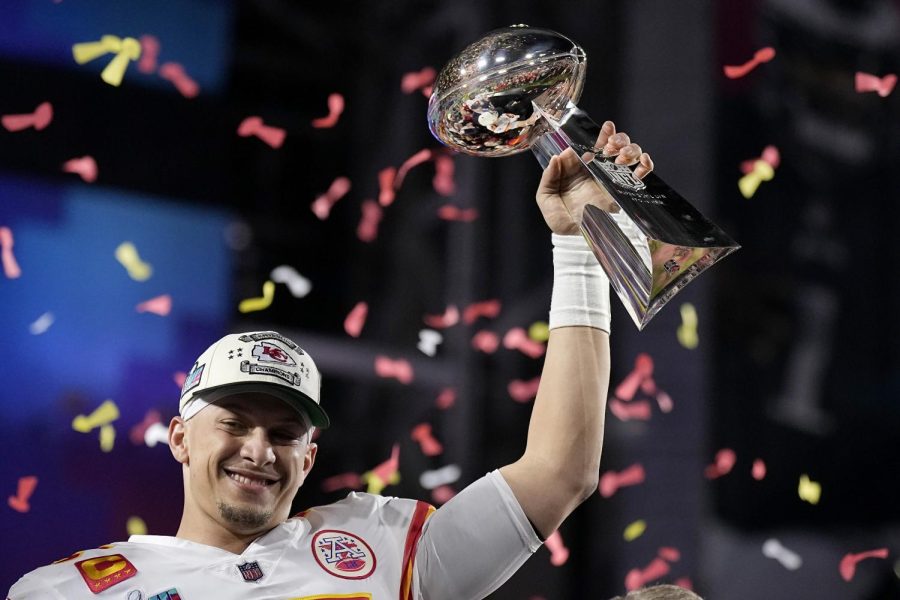Column | Officiating controversies and GOAT debates following Super Bowl 57
Kansas City Chiefs quarterback Patrick Mahomes holds the Vince Lombardi Trophy after the NFL Super Bowl 57 football game against the Philadelphia Eagles, Sunday, Feb. 12, 2023, in Glendale, Ariz.
February 14, 2023
The 2022-23 NFL season officially came to an end with the Kansas City Chiefs defeating the Philadelphia Eagles 38-35 in the Super Bowl on Sunday. In what was a thrilling matchup between the league’s two best teams, fans learned a few crucial things about the state of the modern NFL. First, quarterback Patrick Mahomes is likely on track to pass Tom Brady and become the greatest quarterback of all time, and second, NFL officiating is still very flawed.
When speaking of Mahomes, it feels like “future hall of famer” is already attached to his name going forward. In his five years as a starter, he already has two league MVPs, two Super Bowl wins and two Super Bowl MVPs. Brady, who is widely considered the greatest of all time, had three Super Bowl wins and two Super Bowl MVPs in his first five years, but no league MVPs. They have similar accomplishments over these first five years, but when it comes to statistics, Mahomes begins to blow Brady away.
Through five years as a starter, Brady threw for 18,029 yards, with 123 touchdowns and 66 interceptions. Mahomes has 23,957 yards, with 192 touchdowns and 48 interceptions. Mahomes also adds on a few hundred rushing yards each year — something Brady didn’t do often.
If Brady is truly retired this time, he finishes his career with 89,214 yards, with 649 touchdowns and 212 interceptions over 23 years. If Mahomes also plays 23 years, he is currently on pace for 110,202 yards, 883 touchdowns and 220 interceptions. Mahomes would destroy every passing record in the NFL by a long shot.
After this Super Bowl win, a lot of the sports world is now asking the question, “is Mahomes the GOAT of the NFL?”
Obviously not right now, but he certainly is on his way to earn the title. If he ended his career tomorrow, you could make a case that he is already worthy of entering the Hall of Fame. Two MVPs might be enough to get him in, but adding two Super Bowl wins and Super Bowl MVPs is something that many Hall of Famers never come close to achieving. Mahomes also made it to the Pro Bowl every year he started in the NFL and was selected to the first-team All-Pro twice. Mahomes is a hall of famer and soon, probably the greatest of all time.
Outside of the fantastic performance we saw from Mahomes, there was another performance that the entire NFL had their eyes on — the officials. The officiating of the Super Bowl was suspect, like it was during the entirety of the NFL season. Some things that were called catches probably shouldn’t have been, and some that weren’t catches probably were. Among those two categories are three calls — two that went in favor of the Eagles and one in favor of the Chiefs.
It’s important to know exactly what the NFL defines as a catch first. According to the NFL rule book in Rule 8, Section 1, Articles 3-4, a catch is determined by the following constraints.
First, a player must secure control of the ball before it touches the ground or before going out of bounds. Second, a player has to touch the ground with both feet or any part of the body besides their hands. Third, a “football move” (tucking the ball, turning upfield, extending the ball, taking a step) cements the completion of a catch.
In the first half, Eagles wide receiver DeVonta Smith caught a deep ball from Jalen Hurts on the sideline, getting two feet in bounds before going out and possibly losing control of the football. According to the rule book, Smith controlled the ball and touched both feet in bounds before losing the ball when he was out of bounds. This catch was reviewed and overturned to an incompletion, which is incorrect based on the rulebook.
In the second half, the officiating went against the Chiefs. Eagles running back Miles Sanders caught a screen pass from Hurts and was immediately blown up by L’Jarius Sneed, causing the ball to pop out. This was ruled a fumble on the field, and Nick Bolton scooped it up and scored a touchdown to give the Chiefs a 27-24 lead.
Upon review, the officials overturned it to an incomplete pass and took the touchdown off the board, returning the lead to the Eagles. According to the rule book, Sanders secured control of the ball, touched the ground with both feet and then performed an “act common to the game,” which was turning upfield, before the ball was knocked out. By rule this should be a completed pass and a fumble, but it wasn’t.
Lastly, in the third quarter, Eagles tight end Dallas Goedert caught a pass from Hurts along the sideline for a critical first down. Looking closer at the play, Goedert bobbled the ball as he was heading out of bounds. The Chiefs challenged the call to overturn the play and hold the Eagles to a fourth down, but the officials upheld the call and the Eagles drive continued. According to the rule book, by the time Goedert secured control of the ball he was not touching in bounds with both feet. By rule, this is an incomplete pass.
If the Super Bowl confirmed anything besides the greatness of Mahomes, it’s the fact that the NFL still has a very flawed and inconsistent rule book and officiating system. To rule out further controversy down the road, some rule changes might come around to clean up the officials’ acts.








